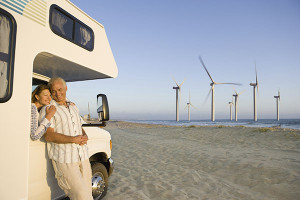
One of the first questions to pop up after the purchase of a recreational vehicle is regarding insurance to protect your new investment. Should you call your auto insurance company and ask about RV coverage? Or should you look at specialized RV insurance policies? It often feels like one more stress when you’re ready to sit back and enjoy your new RV. But it’s the smartest, most effective way to protect the investment you’ve made with your recreational vehicle purchase. It’s worth the cost in the long run due to the peace of mind you’ll have in knowing that you’re covered.
Protecting your Investment with RV Insurance Policies
Nobody actually likes paying for insurance coverage. It’s one of those services that often seem unnecessary. But as soon as the need arises EVERYONE is more than happy to have paid money in the past for coverage now; when they need it. If you need more specific reasons to go ahead and get RV insurance, here are a few to remember:
- Purchasing a policy through an RV Insurance company that deals specifically with recreational vehicles means you’re purchasing a more specific, comprehensive policy for your needs. Adding your RV to your general auto insurance policy means that any aspect of your RV that is specific to recreational vehicles is not covered. Automobile policies cover automobiles. And while recreational vehicles are often automobiles, they are much more than that. They also serve as living quarters; a home on wheels. Your RV Insurance company will offer you policies that will cover both aspects of your RV: auto and home.
- Don’t worry about what type of RV you own when you are trying to decide which insurance company to work with; RV insurance policies are created to cover all types of RVs from the travel trailer to the luxury vehicle to the camper. You’ll find the appropriate coverage for your vehicle with RV specific coverage.
- You’ll get access to replacement coverage. Replacement coverage means that in the event of an accident resulting in a total loss of your vehicle (within the first 5 years of ownership) your insurance will take care of replacing it with a comparable RV (brand new with similar features). After the 5 year time period owners would usually be offered the purchase price of the totaled vehicle. And in the case of a used RV with total replacement coverage totaled vehicles are replaced with the price paid for the RV.
 Choosing Peace of Mind
Choosing Peace of Mind
Choosing to purchase an RV is a big decision. For the majority of RVers it’s also a big investment; one of the biggest they’ll ever make. It’s the smartest thing to do what you can to protect it.
If you feel additional protection on top of a good RV insurance policy is required look into extended warranty options. On average, manufacturer’s warranties last approximately 3 years. Most RVers plan on owning and using their RV for longer than that; making the extended warranty a reasonable option. Extended warranties offer further peace of mind to the RVer who doesn’t want to deal with surprise repairs on the road eating into their budget for their travels!
Both appropriate RV insurance policies and extended warranties offer a lot of peace of mind through a little bit of additional expense. The benefit is well worth the cost!
The information in this article was obtained from various sources. This content is offered for educational purposes only and does not represent contractual agreements, nor is it intended to replace manuals or instructions provided by the manufacturer or the advice of a qualified professional. The definitions, terms and coverage in a given policy may be different than those suggested here and such policy will be governed by the language contained therein. No warranty or appropriateness for a specific purpose is expressed or implied.